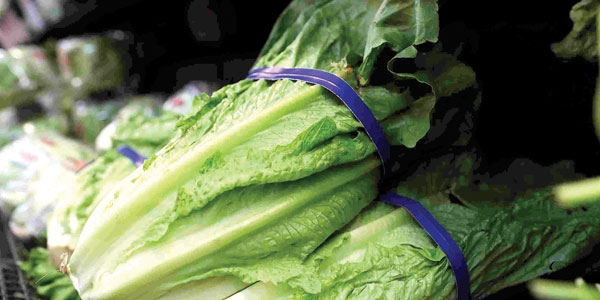
By Chara
The U.S. Centers for Disease Control and Prevention (CDC) has issued a romaine lettuce consumption warning.
Consumers are advised to not eat the lettuce. In addition, retailers and restaurants are advised to not sell or serve it because of an E. coli outbreak.
According to the CDC, 32 people have been infected with E. coli O157:H7 in 11 states and 13 people have been hospitalized. No deaths had been reported at press time.
“(The) FDA (Food and Drug Administration) and states are working to trace back (the) romaine lettuce that ill people ate in the current outbreak,” the CDC stated on its website. “At this time, no common grower, supplier, distributor or brand of romaine lettuce has been identified.”
Although it hasn’t been confirmed, many media outlets are reporting that the origin of the E. coli outbreak might be from romaine lettuce harvested in California.
As investigators continue working to pinpoint the cause, consumers are advised to throw away any romaine lettuce they have at home. This includes whole heads, hearts, bags and boxes of precut lettuce, and salad mixes containing romaine.
People who have consumed romaine lettuce and start feeling sick are advised to visit a doctor and share their symptoms. If possible, they should keep a journal of their symptoms and assist public health investigators, in case they reach out for information. Health investigators have stated that people get sick between two and eight days after ingesting E. coli, which is diagnosed by testing stool samples.
The CDC is asking doctors to avoid prescribing antibiotics for E. coli cases. Studies have shown that using antibiotics to treat E. coli can increase the risk of developing kidney failure.
CDC advierte a consumidores no consumir lechuga romana
Los Centros para el Control y la Prevención de Enfermedades de Estados Unidos (CDC por sus siglas en inglés) ha emitido una advertencia sobre el consumo de lechuga romana.
Se les aconseja a consumidores que no coman la lechuga. Además, se recomienda a los minoristas y restaurantes que no lo vendan o sirvan debido a un brote de E. coli.
Según el CDC, 32 personas han sido infectadas con E. coli O157:H7 en 11 estados y 13 personas han sido hospitalizadas. No se han reportado muertes al cierre de esta edición.
“La FDA (Administración de Drogas y Alimentos) y los estados están trabajando para rastrear (la) lechuga romana que las personas enfermas comieron en el brote actual”, el CDC indicó en su sitio web. “En este momento, no se ha identificado ningún productor, proveedor, distribuidor o marca común de lechuga romana”.
Aunque no se ha confirmado, muchos medios de comunicación informan que el origen del brote de E. coli podría ser la lechuga romana cosechada en California.
Mientras los investigadores continúan trabajando para identificar la causa, se recomienda a los consumidores a tirar la lechuga romana que tengan en casa. Esto incluye cabezas enteras, corazones, bolsas y cajas de lechuga pre-cortada y mezclas de ensaladas que contengan este tipo de lechuga.
A las personas que han consumido lechuga romana y comienzan a sentirse enfermas, se les recomienda visitar a un médico y compartir sus síntomas. Si es posible, deben mantener un diario de sus síntomas y ayudar a los investigadores de salud pública, en caso de que busquen información. Los investigadores de salud han declarado que las personas se enferman entre dos a ocho días después de ingerir E. coli, que se diagnostica mediante el análisis de muestras de heces.
El CDC le está pidiendo a los médicos que eviten recetar antibióticos para casos de E. coli. Los estudios han demostrado que el uso de antibióticos para tratar E. coli puede aumentar el riesgo de desarrollar insuficiencia renal.










